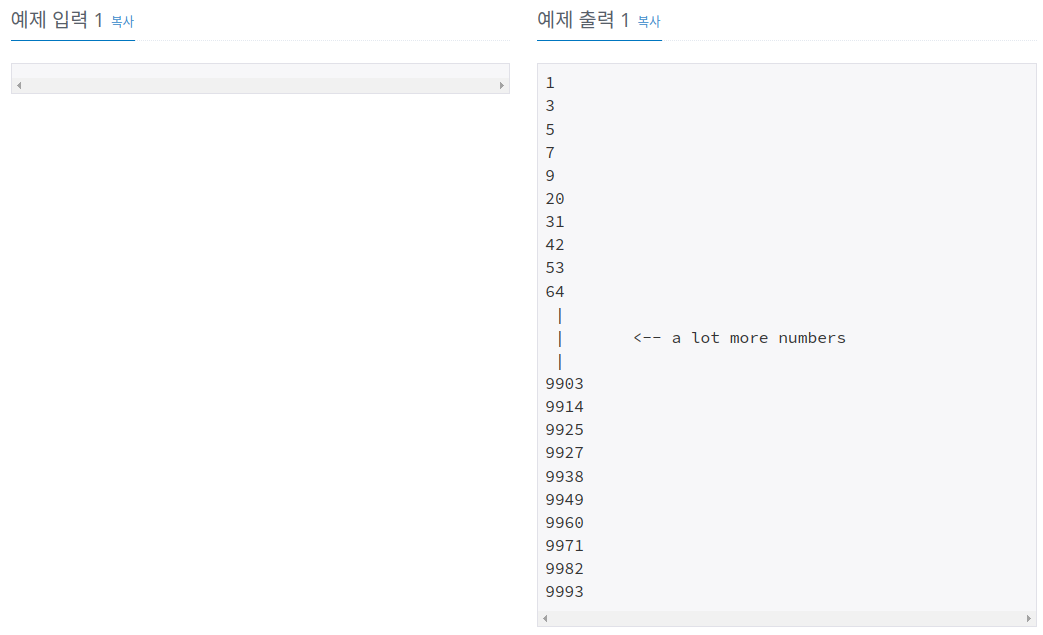

굳이 함수를 만들 필요가 없는 문제지만.. 함수 문제니 만들어야지..
Bash
bash
f_sum() {
local s=$1
local i=0
for ((i=0; i<${#1}; i++)); do
s=$((s + ${1:$i:1}))
done
echo $s
}
arr=({1..10000})
for i in {1..10000}; do
s=`f_sum $i`
idx=-1
for ((j=0; j<${#arr[@]}; j++)); do
if [ ${arr[$j]} == $s ]; then
idx=$j
break
fi
done
if [ $idx != -1 ]; then
arr=(${arr[@]::$idx} ${arr[@]:$idx+1})
fi
done
for x in ${arr[@]}; do
echo $x
done1
2
3
4
5
6
7
8
9
10
11
12
13
14
15
16
17
18
19
20
21
22
23
24
25
26
27
28
2
3
4
5
6
7
8
9
10
11
12
13
14
15
16
17
18
19
20
21
22
23
24
25
26
27
28
Bash에서 함수는 사용법, 파라미터 받는 법 등 모든 게 명령어와 똑같이 사용된다. 즉, Bash는 함수에서도 return을 종료코드로 사용하기 때문에 이를 사용하여 문자열을 리턴할 수 없다.
물론 숫자를 리턴해서 $?로 값을 받으면 되긴 하지만 0은 정상적인 종료, 그 외는 비정상적인 종료를 의미하기 때문에 사용하지 않는 것이 좋다. 대신 함수 내에서 리턴하고 싶은 문자열을 출력하고 그 값을 받으면 된다.
다른 언어들과 달리 Bash는 함수 내에서 변수를 선언하면 기본적으로 전역변수로 선언된다. 지역변수로 선언하려면 local 명령어를 사용하면 된다. (e.g. local var=val)
하지만... 이 문제는 시간이 굉장히 오래 걸려서 시간 초과가 뜬다.
C
c
#include <stdio.h>
int f_sum(int n) {
int s = n;
while (0 < n) {
s += n%10;
n /= 10;
}
return s;
}
int main(void) {
int arr[10000] = {0,};
for (int i=1; i<=10000; i++) {
int s = f_sum(i);
if (s <= 10000) {
arr[s-1] = 1;
}
}
for (int i=0; i<10000; i++) {
if (arr[i] != 1) {
printf("%d\n", i+1);
}
}
return 0;
}1
2
3
4
5
6
7
8
9
10
11
12
13
14
15
16
17
18
19
20
21
22
23
24
25
26
27
28
29
2
3
4
5
6
7
8
9
10
11
12
13
14
15
16
17
18
19
20
21
22
23
24
25
26
27
28
29
Node.js
javascript
const f_sum = function(n) {
let s = n;
for (let m of n+"") {
s += m*1;
}
return s;
}
let arr = [];
for (let i=1; i<=10000; i++) {
arr.push(i);
}
for (let i=1; i<=10000; i++) {
let s = f_sum(i);
let idx = arr.indexOf(s);
if (idx != -1) {
arr.splice(idx, 1);
}
}
console.log(arr.join("\n"));1
2
3
4
5
6
7
8
9
10
11
12
13
14
15
16
17
18
19
20
21
22
23
2
3
4
5
6
7
8
9
10
11
12
13
14
15
16
17
18
19
20
21
22
23
PHP
php
<?php
function f_sum($n) {
$s = $n;
while (0 < $n) {
$s += $n%10;
$n = floor($n/10);
}
return $s;
}
$arr = range(1, 10000);
foreach (range(1, 10000) as $x) {
$s = f_sum($x);
$idx = array_search($s, $arr);
if ($idx != "") {
unset($arr[$idx]);
}
}
echo join("\n", $arr);
?>1
2
3
4
5
6
7
8
9
10
11
12
13
14
15
16
17
18
19
20
2
3
4
5
6
7
8
9
10
11
12
13
14
15
16
17
18
19
20
Python3
python
def f_sum(n):
s = n
for m in str(n):
s += int(m)
return s
arr = [i for i in range(1, 10001)]
for i in range(1, 10001):
s = f_sum(i)
if s in arr: arr.remove(s)
print("\n".join(map(str, arr)))1
2
3
4
5
6
7
8
9
10
11
2
3
4
5
6
7
8
9
10
11
Ruby
ruby
def f_sum(n)
s = n
for m in n.to_s.split("")
s += m.to_i
end
return s
end
arr = Array(1..10000)
for i in 1..10000
s = f_sum(i)
arr.delete_at(arr.index(s)) if arr.index(s)
end
puts arr1
2
3
4
5
6
7
8
9
10
11
12
13
14
2
3
4
5
6
7
8
9
10
11
12
13
14
Comments
Not supported comment edit and upvote
You can do it on this page if you want.